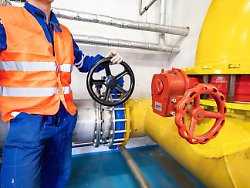Industry warns of import ban
Southern countries call for EU price caps for gas
03/18/2022 at 6:29 p.m
Many EU countries want to work together to counter the exploding energy prices. A common maximum price for gas imports is being discussed. In Germany, the employers’ association is warning of an oil and gas embargo that would result in “production stops”.
In the fight against the rapidly rising energy costs, calls for an EU-wide price cap for gas imports are being made in Europe. France’s Economics Minister Bruno Le Maire said he had suggested such a maximum purchase price to his EU counterparts. This means that negotiations can begin with the three most important gas-supplying countries for the EU: Russia, Norway and Algeria. But there is still resistance from some EU countries against the idea, said Le Maire. “That would be an intervention in the market, which would upset certain European partners.”
Spain, Italy, Portugal and Greece also discussed the idea in the run-up to the European Council at the end of next week. “We talked about the importance of decoupling the electricity market from the gas market and we talked about the possibility of a maximum price on the gas market,” said Italy’s Prime Minister Mario Draghi after the meeting with the heads of government of the three other countries, Pedro Sánchez and António Costa and Kyriacus Mitsotakis. According to Italian media reports, the idea of a maximum price of 100 euros per megawatt hour for imported gas is on the negotiating table.
“Russia’s invasion of Ukraine has ushered in a period of high volatility in the commodity markets, gas market and oil market,” Draghi said. “We must act immediately.” Low-income families and companies must be supported. Sánchez made the proposal for the mini-summit of the four countries. “We must have concrete measures on the table to protect all member states,” Draghi said. The four countries have similar ideas, but the other member states must also be convinced of this, demanded the former head of the European Central Bank.
Under the impression of the Russian attack on Ukraine and the resulting sharp rise in gas prices, the EU Commission has meanwhile announced that it will present measures by the end of March to limit “contagion effects” between gas and electricity prices.
Employers’ association warns against import ban from Russia
In Germany, meanwhile, the dependence on Russian oil and gas is still being discussed. Employers in the metal and electrical industry are warning of a possible energy and raw material embargo for Russian oil and gas. Such a step would “lead in the short term to process heat no longer being available for industry and the manufacturing sector,” said the general manager of the Gesamtmetall industry association, Oliver Zander.
“We would have production stops in many areas within a very short time,” he emphasized. These included the food, meat and chemical industries. The Metallurgical Union (IG Metall) also expressed its opposition to a possible energy and raw materials embargo. “An immediate embargo for gas, hard coal and oil would be counterproductive and would damage the economy and consumers in Germany much more than Russia,” union boss Jörg Hofmann told the “Handelsblatt”.
Zander believes that the war in Ukraine and the economic sanctions against Russia will significantly slow down the recovery of the industry. “The war and its consequences will push the hoped-for upturn far back, that’s already foreseeable.” So far, the association had assumed that the metal and electrical industry would return to the pre-crisis level of 2018 over the course of this year and next.
